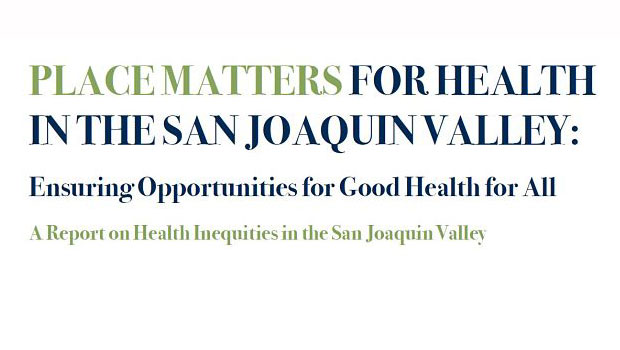Fresno State’s Central Valley Health Policy Institute and the Joint Center for Political and Economic Studies have released a comprehensive analysis of how social, economic and environmental conditions are linked to health outcomes in the region.
“Place Matters for Health in the San Joaquin Valley: Ensuring Opportunities for Good Health for All,” was presented at a press conference Wednesday, Feb. 29, in Fresno.
The study found that social, economic and environmental conditions in low-income and nonwhite neighborhoods make it more difficult for residents there to live healthy lives.
Other findings:
- The rate of premature deaths in the lowest-income zip codes of the San Joaquin Valley is nearly twice that of those in the highest-income zip codes.
- Life expectancy varies by ZIP code from 69 years or less in areas with the lowest life expectancy to 90 or older.
- ZIP codes with the lowest life expectancy tend to have a higher percentage of Hispanic and low-income residents.
The report identifies several policy strategies that can reduce the concentration of health risks in vulnerable communities, while simultaneously increasing health-enhancing resources. The report recommends:
- Policymakers adopt land-use policies that reflect an emphasis on smart and equitable growth.
- Access to affordable housing can be facilitated for poor and immigrant populations.
- Housing mobility can be promoted to help reduce the clustering of immigrants in neighborhoods of concentrated poverty and in areas where exposure to environmental risks is highest.
- Action choices can be adjusted to maximize the goal of considering potential impacts upon racial and ethnic equity in life opportunities, health and well-being.
- Philanthropic and religious groups and other organizations serving the region adopt the “equity in all policies” approach.
The report was released at the opening of the Place Matters: Action Lab. More than 80 health experts and community leaders from across the nation attended to learn about initiatives to address policy and environmental determinants of racial/ethnic and other group differences in health and well-being.
Speaking at the press conference were:
- Dr. Brian Smedley, vice president and director of the Joint Center’s Health Policy Institute, who will introduce the report and talk about project goals.
- Dr. John Capitman, Nickerson Professor of Public Health and executive director, of the Central Valley Health Policy Institute, who will provide an overview of findings.
- Genoveva Islas-Hooker, regional program director of the Central California Regional Obesity Prevention Program, and Herera, outreach coordinator of the Community Water Center, providing community perspectives on the roots of health inequities.
The Central Valley Health Policy Institute is housed under the Central California Center for Health and Human Services and College of Health and Human Services at California State University, Fresno.
The study was supported by a grant from the National Institute on Minority Health and Health Disparities of the National Institutes of Health.
For more information, please contact Capitman at 559.228.2157 or 559.855.3688.
Related links:
- Central Valley Health Policy Institute, Place Matters
- Joint Center for Political and Economic Studies





